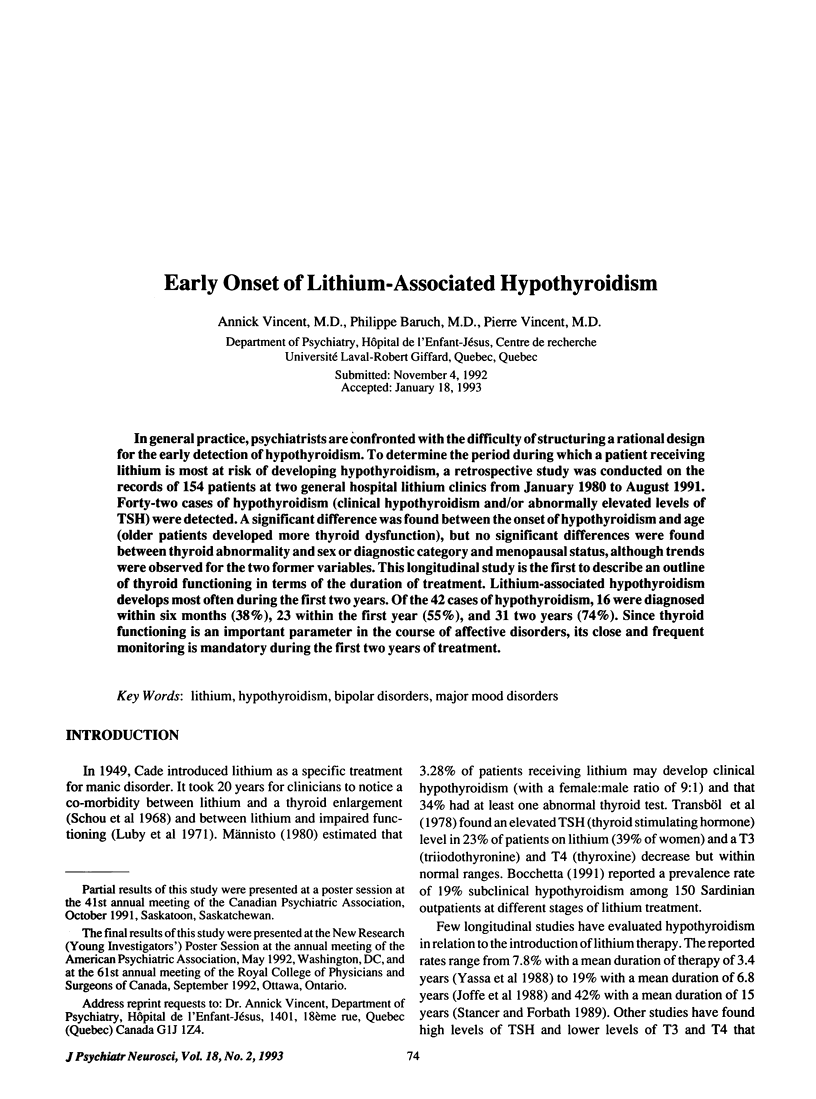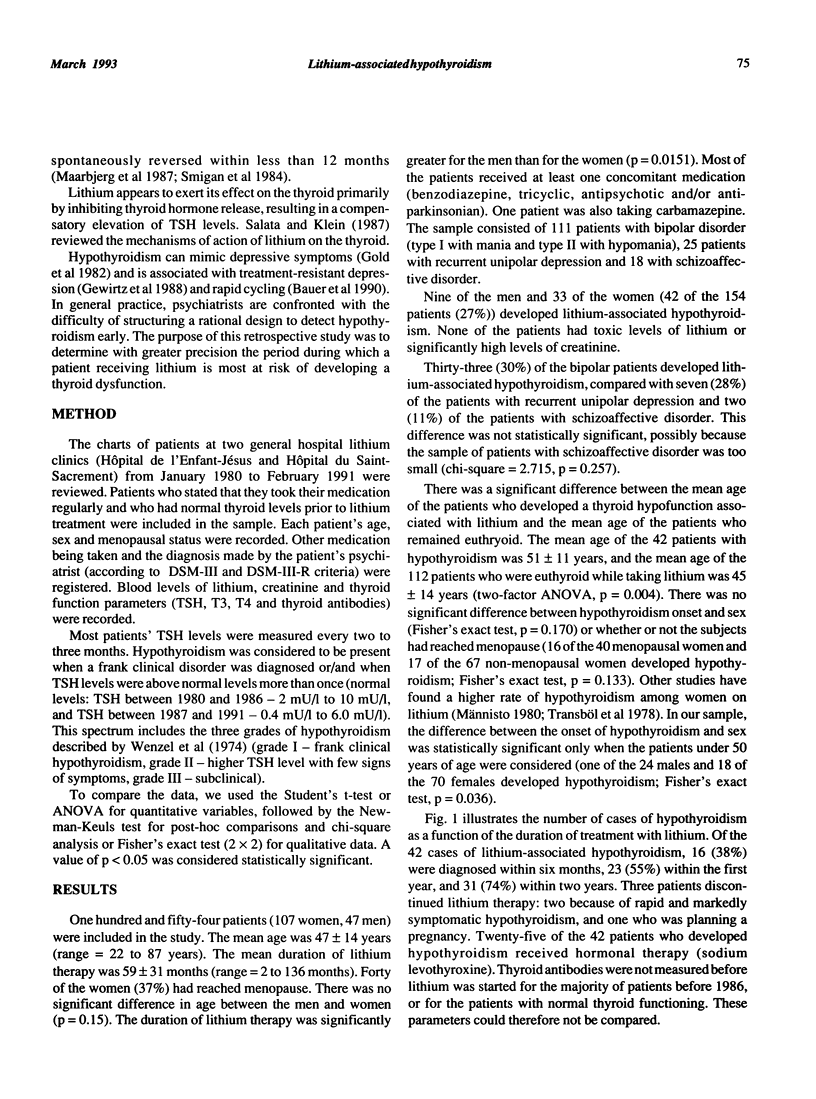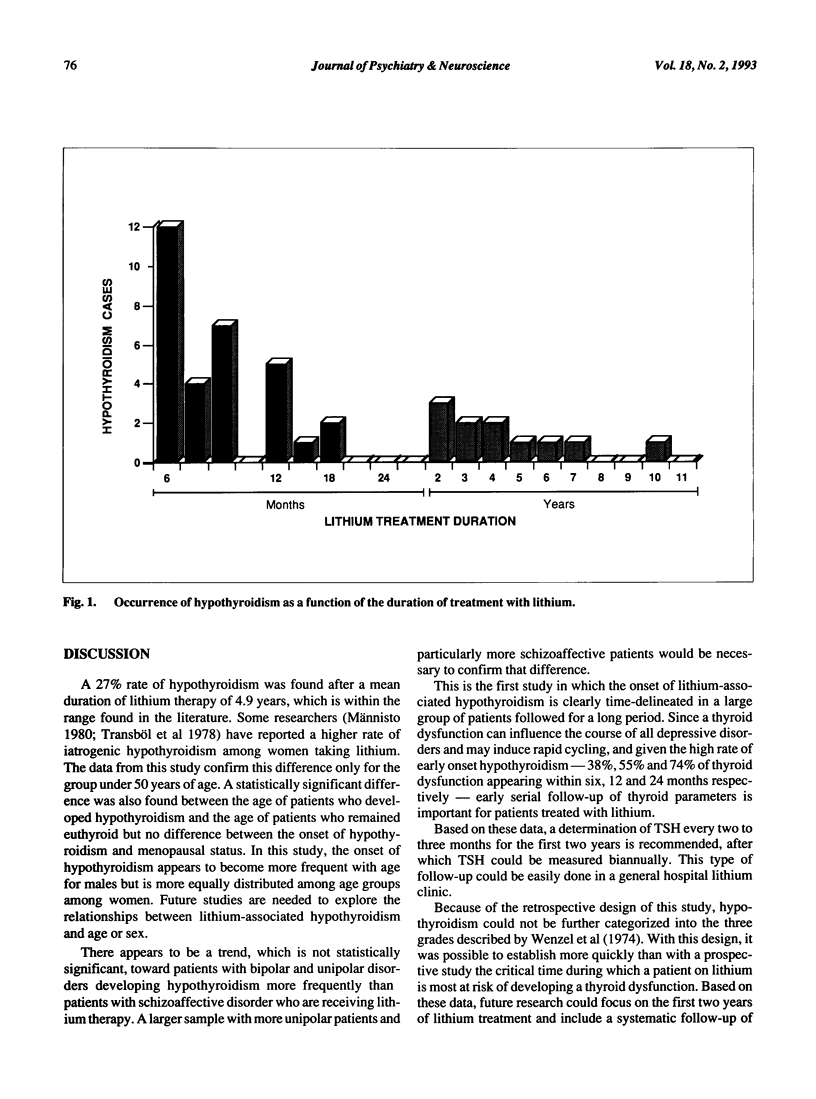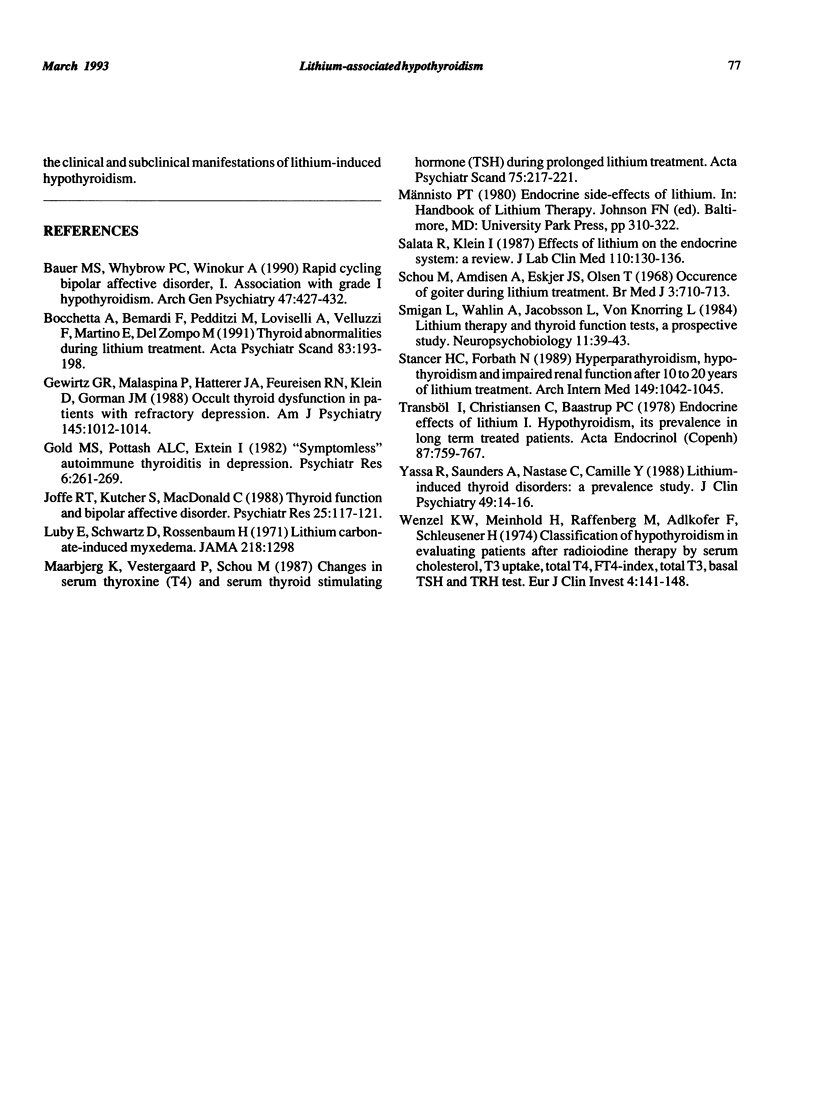Abstract
In general practice, psychiatrists are confronted with the difficulty of structuring a rational design for the early detection of hypothyroidism. To determine the period during which a patient receiving lithium is most at risk of developing hypothyroidism, a retrospective study was conducted on the records of 154 patients at two general hospital lithium clinics from January 1980 to August 1991. Forty-two cases of hypothyroidism (clinical hypothyroidism and/or abnormally elevated levels of TSH) were detected. A significant difference was found between the onset of hypothyroidism and age (older patients developed more thyroid dysfunction), but no significant differences were found between thyroid abnormality and sex or diagnostic category and menopausal status, although trends were observed for the two former variables. This longitudinal study is the first to describe an outline of thyroid functioning in terms of the duration of treatment. Lithium-associated hypothyroidism develops most often during the first two years. Of the 42 cases of hypothyroidism, 16 were diagnosed within six months (38%), 23 within the first year (55%), and 31 two years (74%). Since thyroid functioning is an important parameter in the course of affective disorders, its close and frequent monitoring is mandatory during the first two years of treatment.
Full text
PDF



Selected References
These references are in PubMed. This may not be the complete list of references from this article.
- Bauer M. S., Whybrow P. C., Winokur A. Rapid cycling bipolar affective disorder. I. Association with grade I hypothyroidism. Arch Gen Psychiatry. 1990 May;47(5):427–432. doi: 10.1001/archpsyc.1990.01810170027005. [DOI] [PubMed] [Google Scholar]
- Bocchetta A., Bernardi F., Pedditzi M., Loviselli A., Velluzzi F., Martino E., Del Zompo M. Thyroid abnormalities during lithium treatment. Acta Psychiatr Scand. 1991 Mar;83(3):193–198. doi: 10.1111/j.1600-0447.1991.tb05523.x. [DOI] [PubMed] [Google Scholar]
- Gewirtz G. R., Malaspina D., Hatterer J. A., Feureisen S., Klein D., Gorman J. M. Occult thyroid dysfunction in patients with refractory depression. Am J Psychiatry. 1988 Aug;145(8):1012–1014. doi: 10.1176/ajp.145.8.1012. [DOI] [PubMed] [Google Scholar]
- Gold M. S., Pottash A. L., Extein I. "Symptomless" autoimmune thyroiditis in depression. Psychiatry Res. 1982 Jun;6(3):261–269. doi: 10.1016/0165-1781(82)90015-4. [DOI] [PubMed] [Google Scholar]
- Joffe R. T., Kutcher S., MacDonald C. Thyroid function and bipolar affective disorder. Psychiatry Res. 1988 Aug;25(2):117–121. doi: 10.1016/0165-1781(88)90042-x. [DOI] [PubMed] [Google Scholar]
- Luby E. D., Schwartz D., Rosenbaum H. Lithium-carbonate-induced myxedema. JAMA. 1971 Nov 22;218(8):1298–1299. [PubMed] [Google Scholar]
- Maarbjerg K., Vestergaard P., Schou M. Changes in serum thyroxine (T4) and serum thyroid stimulating hormone (TSH) during prolonged lithium treatment. Acta Psychiatr Scand. 1987 Feb;75(2):217–221. doi: 10.1111/j.1600-0447.1987.tb02778.x. [DOI] [PubMed] [Google Scholar]
- Salata R., Klein I. Effects of lithium on the endocrine system: a review. J Lab Clin Med. 1987 Aug;110(2):130–136. [PubMed] [Google Scholar]
- Schou M., Amdisen A., Eskjaer Jensen S., Olsen T. Occurrence of goitre during lithium treatment. Br Med J. 1968 Sep 21;3(5620):710–713. doi: 10.1136/bmj.3.5620.710. [DOI] [PMC free article] [PubMed] [Google Scholar]
- Smigan L., Wahlin A., Jacobsson L., von Knorring L. Lithium therapy and thyroid function tests. A prospective study. Neuropsychobiology. 1984;11(1):39–43. doi: 10.1159/000118048. [DOI] [PubMed] [Google Scholar]
- Stancer H. C., Forbath N. Hyperparathyroidism, hypothyroidism, and impaired renal function after 10 to 20 years of lithium treatment. Arch Intern Med. 1989 May;149(5):1042–1045. [PubMed] [Google Scholar]
- Transbøl I., Christiansen C., Baastrup P. C. Endocrine effects of lithium. I. Hypothyroidism, its prevalence in long-term treated patients. Acta Endocrinol (Copenh) 1978 Apr;87(4):759–767. [PubMed] [Google Scholar]
- Wenzel K. W., Meinhold H., Raffenberg M., Adlkofer F., Schleusener H. Classification of hypothyroidism in evaluating patients after radioiodine therapy by serum cholesterol, T3-uptake. Total T4, FT4-index, total T3, basal TSH and TRH-test. Eur J Clin Invest. 1974 Apr;4(2):141–148. doi: 10.1111/j.1365-2362.1974.tb00385.x. [DOI] [PubMed] [Google Scholar]
- Yassa R., Saunders A., Nastase C., Camille Y. Lithium-induced thyroid disorders: a prevalence study. J Clin Psychiatry. 1988 Jan;49(1):14–16. [PubMed] [Google Scholar]


